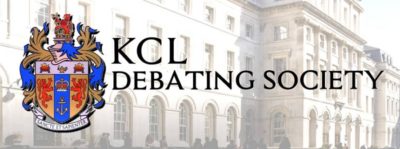Cambridge wins KCL Open 2018
 Portrait of a Tudor as a young Al (Tudor Musat and Alasdair Donovan, Cambridge) have won the 2018 edition of the KCL Open. Organized by conveners Emily Frizell and Joel Richardson, the tournament took place from June 30th to July 2nd at the King’s College in London and was chief-adjudicated by Srishti Krishnamoorthy-Cavell, Tejaswini Krishnaprasad and Cian Luddy.
Portrait of a Tudor as a young Al (Tudor Musat and Alasdair Donovan, Cambridge) have won the 2018 edition of the KCL Open. Organized by conveners Emily Frizell and Joel Richardson, the tournament took place from June 30th to July 2nd at the King’s College in London and was chief-adjudicated by Srishti Krishnamoorthy-Cavell, Tejaswini Krishnaprasad and Cian Luddy.
In a grand final judged by Tim Squirrel (chair), Clara Rupf, George Goddard, James Laird-Smith and Penny Sadeghi, Portrait of a Tudor as a young Al (OO) faced Remember, big speaks gaps are homophobic (Joe Roussos and Imogen Harper-Lawrence, OG, Oxford), I guess technically Oxford (Harish Natarajan and Jure Hederih, CG, open team) and Ex Astris, Verus Praedium (Nick Vervoudis and Freddie Marshall, CO, Warwick). The motion read “THW welcome an isolationist America”.
The Pro-Am final was won by Speak Expropriation without Compensation (Fraser McConachie and Gustav Conradie, open team) in CO against Escape from the Motherland (Ruyi Ho and Ying Ying, OG, LSE), Anarchy, state and Lootopia (Joshua Loo and Jonny Heywood, OO, Westminster) and Mech eng is for noob (Becky Elkington and Shahira Yasmin, CG, Imperical College) on the motion “TH, as the survivor community, would choose not to [carry on the human race] (with infoslide)”. This round was judged by Daniel Klein (chair), Chris Paschali, Nicole O’Sullivan and Srishti Krishnamoorthy-Cavell.
The best speaker of the tournament was Harish Natarajan with an average of 83 speaker points.
The Judge Break:
Tim Squirrel, Clara Rupf, George Goddard, James Laird-Smith, Penny Sadeghi, Daniel Klein, Chris Paschali, Mairead O’Leary, Nicole O’Sullivan, Srishti Krishnamoorthy-Cavell, Jamie Baross, Jan-Gunther Gosselke, Sinéad Ní Harachtáin and Eve Colyer.
The break:
I guess technically Oxford (Harish Natarajan and Jure Hederih, open) – 12
Remember, big speaks gaps are homophobic (Joe Roussos and Imogen Harper-Lawrence, Oxford) – 12
No Pressure (Gigi Gil and Matt Hazell, Open) – 11
Portrait of a Tudor as a young Al (Tudor Musat and Alasdair Donovan, Cambridge) – 11
Our Chinglish Is Very Good (Andrew Seow and Rachel O’Nunain, Oxford) – 11
Ex Astris, Verus Praedium (Nick Zervoudis and Freddie Marshall, Warwick) – 11
Oxford C (Louis Collier and Rosa Thomas, Oxford) – 10
I remember when all of this was ULU (Alex Harris and Matthew Creese, Open) – 10
The Pro-Am break:
Escape from the Motherland (Ruyi Ho and Ying Ying, LSE) – 8
Anarchy, State and Lootopia (Joshua Loo and Jonny Heywood, Westminster) – 8
Mech eng is for noob (Becky Elkington and Shahira Yasmin, Imperial) – 8
Speak Expropriation without Compensation (Fraser McConachie and Gustav Conradie, Open) – 7
Motions:
R1: THW censor any music which promotes derogatory attitudes towards women.
R2: THB the EU should offer automatic membership to any constituent member that leaves the United Kingdom.
Infoslide: For the purposes of this debate, “constituent member” refers to England, Scotland, Wales or Northern Ireland.R3: THR the self-commercialisation of indigenous culture. (For example, Maori “village tours”, Aboriginal art fairs, and Native American casinos).
R4: THWB all forms of self-incrimination.
Infoslide: Self incrimination, in law, refers to the provision of evidence or making statements that implicates or connects an individual accused of crime to the crime. Usually, countries do have some protections (on paper) against compelled self-incrimination, such as the right to remain silent, Article 20(3) of the Indian Constitution, etc. For the purposes of the debate, acts that would constitute self-incrimination would include confessions by individuals during police interrogations, testifying against oneself in court trials and agreeing to plead guilty in exchange for a lower sentence or sympathetic treatment from the courts (plea bargains).R5: THB that the countries of former Yugoslavia should create a common history curriculum and textbook.
SF: THR the existence of caste-based political parties in India.
Infoslide: There is an entrenched problem with the casteism in India. There are regionally dominant caste-based political parties that explicitly claim to represent the interests of marginalised castes such as Dalits. Examples of some such parties include Bahujan Samaj Party (BSP) in Uttar Pradesh, Puthiya Tamilagam (PT) in Tamil Nadu and Republican Party of India (RPI) in Maharashtra.Pro-Am Final: TH, as the survivor community, would choose not to.
Infoslide: The earth has been devastated by an environmental cataslysm. Nearly all of the human population is gone, government and infrastructure is functionally non-existent, and life is harsh. A small survivor community persists, with just enough numbers to reliably carry on the human race.F: THW welcome an isolationist America.
Infoslide: For the purpose of this debate, the term isolationism refers to all aspects of foreign policy, including trade, military, and diplomacy.
jgg./jm.





